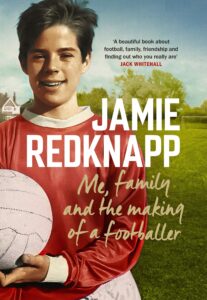 In recent times, Jamie Redknapp has emerged as something of a TV personality, first as a football pundit and later as a captain on the sports comedy panel show A League of Their Own and its spin-off ‘travelogue’ shows, but rewind thirty years and you’re taken back to the start of a very different story that begins with a supremely talented and dedicated young footballer. Jamie Redknapp’s first autobiography takes readers back to that very beginning.
In recent times, Jamie Redknapp has emerged as something of a TV personality, first as a football pundit and later as a captain on the sports comedy panel show A League of Their Own and its spin-off ‘travelogue’ shows, but rewind thirty years and you’re taken back to the start of a very different story that begins with a supremely talented and dedicated young footballer. Jamie Redknapp’s first autobiography takes readers back to that very beginning.
From his earliest days, Jamie Redknapp lives and breathes football, but his is not just your ordinary childhood experience of football. The son of footballer, and later manager, Harry Redknapp, Jamie’s earliest years are spent watching from the side-lines as his dad lines up for Seattle Sounders, Phoenix Fire and Bournemouth against Pele et al, chatting to his dad’s friend Bobby Moore and his uncle Frank Lampard senior, and having a kick-about in the back garden with George Best and later his cousin Frank Lampard. These experiences clearly helped and motivated a young Jamie, but it would be simplistic to think his success was a given. If that were the case, every child of a half-decent footballer would therefore be a pro, but that is far from the reality. Indeed, Jamie’s success actually is something of an anomaly and for those who wonder why more children of footballers themselves don’t become footballers, the book serves as a reminder that there’s more to success in the sport than lineage, genes and even talent. Indeed, Jamie impresses that whilst he may get some ability from his dad, his attitude is very much from his mum, and this combination is integral to his success.
So too, though, is his almost obsessive attitude towards the sport and the hours spent practising. Young Jamie is defined by a certain degree of obsessiveness and dedication that belies his years. He is a very particular and exacting child, and his discipline and focus are evident, and again there is a sense that whilst Jamie may have inherited some talent, it is his character, his drive, which determines his success. The advantage of his early years, of being immersed in football and growing up around the sport, seems to be borne out more in his understanding of the game and its tactics, as well as of team and changing-room culture, rather than the actual playing side. Talent and hard work complement that early context, but there’s always a sense of a combination of factors needed to succeed as a footballer, that genealogy alone won’t suffice. In fact, in some ways, being the son of a footballer seems to bring additional challenges – the expectations to live up to, the pressure of matching up to his dad, the inevitable comparisons, and the taunting by team-mates and opponents alike.
What is also intriguing to see in this account of the life of the son of a footballer is the way Harry treats him. There is never any parental pressure or harsh words, Harry leaves Jamie to it and follows his lead when it comes to Jamie’s career. The title of the autobiography couldn’t be more apt: Me, Family and the Making of a Footballer, for it is clear throughout that there are two loves of young Jamie’s life: football and family. And although family tends to play a part in most autobiographies to some degree, I’ve never had the sense of such a close, loving unit as the Redknapp’s. It’s not just a case of a mention here or there of his family, but a continuous thread throughout the memoir that is rooted in real, authentic respect, affection and love. And whilst Jamie admits to dabbling in the dark arts of football – the little tricks and incursions to thwart an opponent – the lasting impression is of a thoroughly decent human being and nice guy and of a similarly nice family – although some of Harry’s players may question that on the basis of Jamie’s reflections on his temper! There are some lovely words from Harry at the end of the book, about Jamie’s quality, his potential, but also the importance of being a good, honest person, and again this seems to perfectly sum up the qualities of not only Jamie, but the Redknapp’s – that football is important, but that values and family are more important.
The autobiography ends, somewhat unusually, when Jamie is eighteen, having just moved to Liverpool and scored his first goal, and one of my recurring issues with memoirs is that, in condensing a life story into a single book, they can often feel rushed and compressed, so the decision to focus almost microscopically on just Jamie’s formative years is a welcome one, I felt. It gives greater depth and richness to the life story and allows space for this period to be delved into in full. Yet it never drags or feels slowed down by this abbreviated timeframe. Indeed, there is so much to tell that the book easily justifies this approach and only serves to show how other autobiographies perhaps skimp on content and detail by sticking to the full life-story approach. Admittedly, Jamie’s childhood has perhaps more than its fair share of anecdotes and adventures, but it just goes to show that there is so much more to tell in a person’s history. And whilst it may be a good marketing ploy, to get readers to buy more than one book, as presumably there will be a follow-up (or two), I don’t begrudge that at all because the book feels so much richer and more detailed. The only thing I do begrudge if there are subsequent books is the inevitable wait for the next one!
Despite my positive inclination towards the structure of the book, I must admit that I was not wholly convinced by, or satisfied with, the voice of the memoir. For some reason, I didn’t really get a sense of Jamie Redknapp’s voice. Perhaps because he’s so present on TV, it feels as if you know him and his voice and the narrative voice in the autobiography just didn’t seem individual or personalised enough, but it may be a perfectly true reflection; it just didn’t quite hit the right note for me. However, I loved the inclusion of sections from other people from Jamie’s story – not only dad Harry, mum Sandra and brother Mark, but early team-mates, managers and coaches, which really added to the book, and is certainly something other autobiographies could borrow.
Jamie Redknapp’s career may have branched off in recent years and his footballing journey may have been reduced to a story of injuries and what-ifs, but this book is a reminder of Jamie’s talent, his footballing pedigree and his early promise, motivation and success. It is a journey through a young footballer’s life and his desire to make his own mark, but it is also a portrait of a loving family.
Jade Craddock
(Publisher: Headline. October 2020. Hardcover: 336 pages)
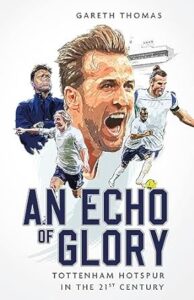 An Echo of Glory: Tottenham Hotspur in the 21st Century delves into the famous club’s recent past to uncover how Spurs emerged from a stagnant period in the 1990s to once again compete for the game’s highest honours.
An Echo of Glory: Tottenham Hotspur in the 21st Century delves into the famous club’s recent past to uncover how Spurs emerged from a stagnant period in the 1990s to once again compete for the game’s highest honours.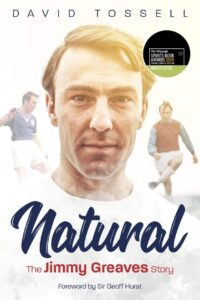 Jimmy Greaves remains the greatest goalscorer in English football history, with a record of 357 top-flight goals that may never be surpassed.
Jimmy Greaves remains the greatest goalscorer in English football history, with a record of 357 top-flight goals that may never be surpassed. All good things come in threes, just ask any footballer who’s ever scored a hat-trick. In fact, ask Peter Crouch who has scored many a hat-trick and has just released his third book. So that’s a hat-trick for a England and a hat-trick of books to his name, surely placing the former forward in a league of his own as the only person to have achieved a triumvirate in both fields? Answers on a postcard if you know otherwise. But, either way, both accomplishments are no mean feat and just as with a hat-trick the third goal seals the deal, so too does Crouch’s third book affirm what his previous two tomes pointed towards: Crouch is a natural and compelling storyteller. Having previously covered the weird and wonderful life of being a footballer to great effect, this latest book changes its focus slightly to the weird and wonderful life of being a former football, that is the jobs and careers of retired footballers, and, no, before you ask, it’s not all working on their golf handicap, though, I’m sure, a few of them do that too.
All good things come in threes, just ask any footballer who’s ever scored a hat-trick. In fact, ask Peter Crouch who has scored many a hat-trick and has just released his third book. So that’s a hat-trick for a England and a hat-trick of books to his name, surely placing the former forward in a league of his own as the only person to have achieved a triumvirate in both fields? Answers on a postcard if you know otherwise. But, either way, both accomplishments are no mean feat and just as with a hat-trick the third goal seals the deal, so too does Crouch’s third book affirm what his previous two tomes pointed towards: Crouch is a natural and compelling storyteller. Having previously covered the weird and wonderful life of being a footballer to great effect, this latest book changes its focus slightly to the weird and wonderful life of being a former football, that is the jobs and careers of retired footballers, and, no, before you ask, it’s not all working on their golf handicap, though, I’m sure, a few of them do that too.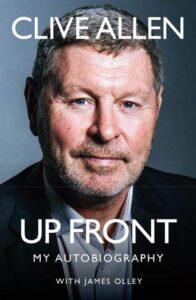 Clive Allen is one of the finest goalscorers of his generation but arguably his biggest battle has been to prove himself the best in his own family.
Clive Allen is one of the finest goalscorers of his generation but arguably his biggest battle has been to prove himself the best in his own family. In recent times, Jamie Redknapp has emerged as something of a TV personality, first as a football pundit and later as a captain on the sports comedy panel show A League of Their Own and its spin-off ‘travelogue’ shows, but rewind thirty years and you’re taken back to the start of a very different story that begins with a supremely talented and dedicated young footballer. Jamie Redknapp’s first autobiography takes readers back to that very beginning.
In recent times, Jamie Redknapp has emerged as something of a TV personality, first as a football pundit and later as a captain on the sports comedy panel show A League of Their Own and its spin-off ‘travelogue’ shows, but rewind thirty years and you’re taken back to the start of a very different story that begins with a supremely talented and dedicated young footballer. Jamie Redknapp’s first autobiography takes readers back to that very beginning.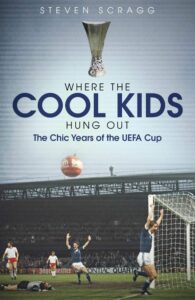 Back in September 2019,
Back in September 2019, 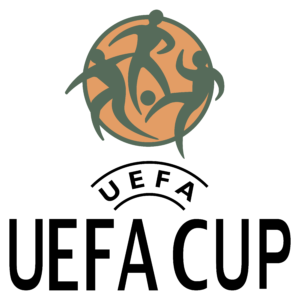 As with the Cup Winners’ Cup, changes to the UEFA Cup came about through the breakup of the former Communist bloc, necessitating the introduction of a Preliminary Round to the competition. With the two-legged Finals gone in 1996/97 the first steps of change arrived, as the Final morphed into a one-off game at a neutral venue. Further transformation came with the Cup Winners’ Cup demise at the end of 1998/99, and the Groups Stages established in the competition in 2004/05, with the ‘rebrand’ complete in 2009/10. Part of this includes those clubs failing to qualify for the Champions League knock-out stages dropping into the Europa League, which as Scragg acknowledges gives the impression of it being a second-rate competition. As he so brilliantly puts it, “essentially the Europa League is the MK Dons of European club football tournaments. There is a sad sense of franchise about it.”
As with the Cup Winners’ Cup, changes to the UEFA Cup came about through the breakup of the former Communist bloc, necessitating the introduction of a Preliminary Round to the competition. With the two-legged Finals gone in 1996/97 the first steps of change arrived, as the Final morphed into a one-off game at a neutral venue. Further transformation came with the Cup Winners’ Cup demise at the end of 1998/99, and the Groups Stages established in the competition in 2004/05, with the ‘rebrand’ complete in 2009/10. Part of this includes those clubs failing to qualify for the Champions League knock-out stages dropping into the Europa League, which as Scragg acknowledges gives the impression of it being a second-rate competition. As he so brilliantly puts it, “essentially the Europa League is the MK Dons of European club football tournaments. There is a sad sense of franchise about it.”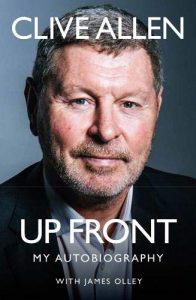 A career in football is hard enough to achieve on your own, but when you are from a football family, then the pressure must be immense. For Clive Allen, that must have been monumental, with his father, Les, part of the Tottenham Hotspur’s team that did the ‘double’ in winning the First Division title and FA Cup in 1960/61, and a younger brother, Bradley and two cousins, Martin and Paul, who also went on to have professional careers in the game.
A career in football is hard enough to achieve on your own, but when you are from a football family, then the pressure must be immense. For Clive Allen, that must have been monumental, with his father, Les, part of the Tottenham Hotspur’s team that did the ‘double’ in winning the First Division title and FA Cup in 1960/61, and a younger brother, Bradley and two cousins, Martin and Paul, who also went on to have professional careers in the game.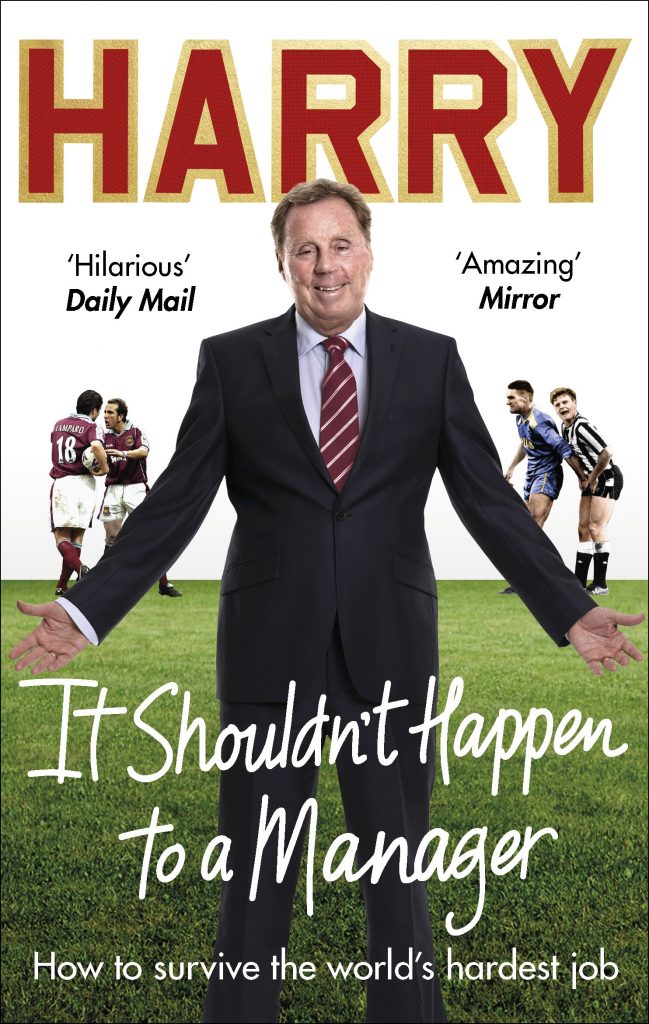
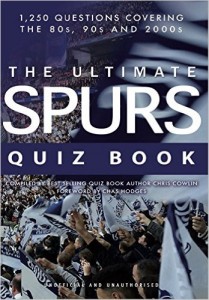 Are you a Spurs fan? Have you followed the team’s progress through good times and bad? Would you like to test your memory of the people and places that have shaped the club through the 80s, 90s and 2000s?
Are you a Spurs fan? Have you followed the team’s progress through good times and bad? Would you like to test your memory of the people and places that have shaped the club through the 80s, 90s and 2000s?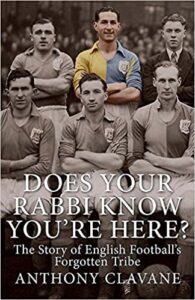 When I was growing up, the football book market was pretty much restricted to lazy and often ‘ghosted’ biographies, where ‘the boys done good’ mentality was about as incisive as it got. Thankfully, as the early 1990’s emerged this changed, with books such as “Fever Pitch” by Nick Hornby paving the way for a better expression of the fan experience and the beautiful game in a wider context. Following in this vein Anthony Clavane wrote the Award winning “Promised Land: A Northern Love Story”, which tells the tale of the rise and fall of Leeds United, intertwined with that of the City of Leeds and of the Jewish community.
When I was growing up, the football book market was pretty much restricted to lazy and often ‘ghosted’ biographies, where ‘the boys done good’ mentality was about as incisive as it got. Thankfully, as the early 1990’s emerged this changed, with books such as “Fever Pitch” by Nick Hornby paving the way for a better expression of the fan experience and the beautiful game in a wider context. Following in this vein Anthony Clavane wrote the Award winning “Promised Land: A Northern Love Story”, which tells the tale of the rise and fall of Leeds United, intertwined with that of the City of Leeds and of the Jewish community.